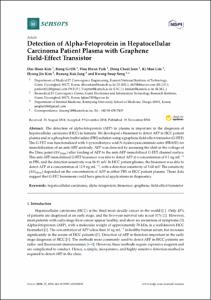KUMEL Repository
1. Journal Papers (연구논문)
1. School of Medicine (의과대학)
Dept. of Internal Medicine (내과학)
Detection of Alpha-Fetoprotein in Hepatocellular Carcinoma Patient Plasma with Graphene Field-Effect Transistor
- Keimyung Author(s)
- Jang, Byoung Kuk
- Department
- Dept. of Internal Medicine (내과학)
- Journal Title
- Sensors (Basel)
- Issued Date
- 2018
- Volume
- 18
- Issue
- 11
- Abstract
- The detection of alpha-fetoprotein (AFP) in plasma is important in the diagnosis of hepatocellular carcinoma (HCC) in humans. We developed a biosensor to detect AFP in HCC patient plasma and in a phosphate buffer saline (PBS) solution using a graphene field-effect transistor (G-FET). The G-FET was functionalized with 1-pyrenebutyric acid N-hydroxysuccinimide ester (PBASE) for immobilization of an anti-AFP antibody. AFP was detected by assessing the shift in the voltage of the Dirac point (DVDirac) after binding of AFP to the anti-AFP-immobilized G-FET channel surface. This anti-AFP-immobilized G-FET biosensor was able to detect AFP at a concentration of 0.1 ng mL1 in PBS, and the detection sensitivity was 16.91 mV. In HCC patient plasma, the biosensor was able to detect AFP at a concentration of 12.9 ng mL1, with a detection sensitivity of 5.68 mV. The sensitivity (DVDirac) depended on the concentration of AFP in either PBS or HCC patient plasma. These data suggest that G-FET biosensors could have practical applications in diagnostics.
- Keimyung Author(s)(Kor)
- 장병국
- Publisher
- School of Medicine (의과대학)
- Citation
- Dae Hoon Kim et al. (2018). Detection of Alpha-Fetoprotein in Hepatocellular Carcinoma Patient Plasma with Graphene Field-Effect Transistor. Sensors (Basel), 18(11). doi: 10.3390/s18114032
- Type
- Article
- ISSN
- 1424-8220
- Source
- https://www.mdpi.com/1424-8220/18/11/4032
- Appears in Collections:
- 1. School of Medicine (의과대학) > Dept. of Internal Medicine (내과학)
- 파일 목록
-
-
Download
 oak-2018-1692.pdf
기타 데이터 / 4.92 MB / Adobe PDF
oak-2018-1692.pdf
기타 데이터 / 4.92 MB / Adobe PDF
-
Items in Repository are protected by copyright, with all rights reserved, unless otherwise indicated.